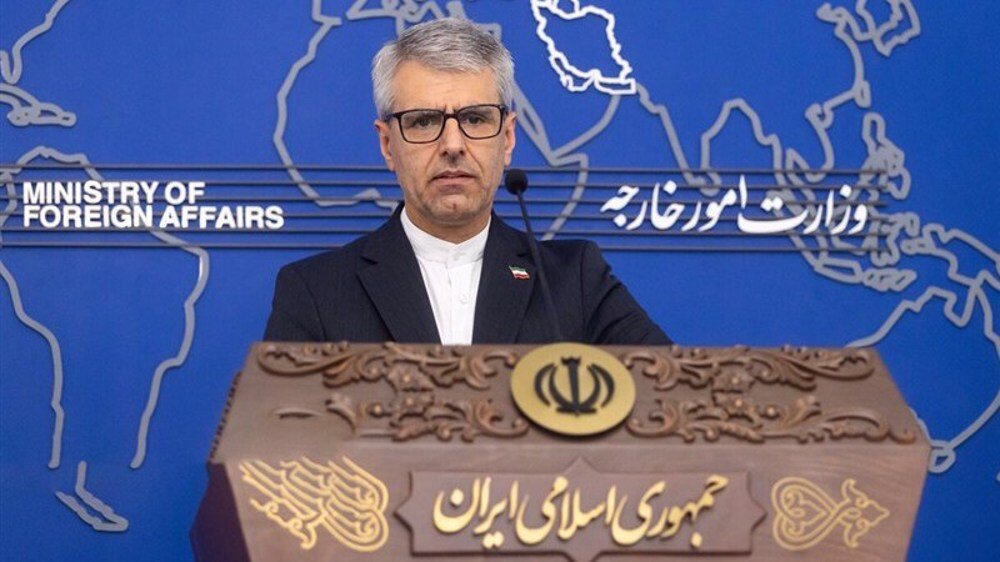No return to talks without guarantee of diplomatic effectiveness: Iran foreign ministry

TEHRAN — Iran will not reenter nuclear negotiations unless it is assured of diplomacy’s effectiveness, Foreign Ministry spokesman Esmail Baghaei said Monday, warning against politicizing the concept of dialogue and reaffirming Iran’s commitment to defending its national interests through both diplomatic and military means.
“As long as we are not confident in the efficacy of diplomacy and the negotiation process, we will not engage in such talks,” Baghaei stated at his weekly press conference in Tehran.
Rejecting the false binary of “negotiation or no negotiation,” Baghaei stressed that diplomacy must not be stigmatized or discredited.
“Diplomacy is not a performance stage. It is a strategic tool and an opportunity, and under no circumstances are we permitted to deprive the country of it—especially as a means to express Iran’s position, defend its interests, and secure national rights,” he said.
He added that just as Iran’s Armed Forces remain committed to defending the nation with strength, the country’s diplomatic apparatus must also use diplomacy wisely to further the same national goals.
‘International community’s silence on atrocities in Gaza is shocking’
Baghaei also denounced Israeli airstrikes on humanitarian aid areas in Gaza, blaming the international community’s silence for ongoing atrocities.
“The main reason the Zionist regime continues its crimes and genocide in Gaza is its absolute impunity,” he said. “Over the past two years, we’ve witnessed unprecedented genocide, and all states are obligated to take action.”
‘Snapback mechanism lacks legal or moral legitimacy’
Turning to the potential reactivation of the so-called snapback sanctions mechanism under UN Security Council Resolution 2231, Baghaei firmly rejected the idea.
“There is no legal or political basis for the snapback mechanism. Today, more than ever, invoking this mechanism is devoid of legal or ethical justification. It’s merely a politicized tool misused from within Resolution 2231,” he said.
Baghaei stressed that Iran continues to consider itself a JCPOA member, having reduced its commitments in response to the U.S. withdrawal and continued violations by European signatories.
“Exactly one year after the U.S. withdrawal, Iran began scaling back its commitments. But the European parties themselves violated the agreement and failed to fulfill their obligations. They have no standing to invoke any mechanism now.”
He added that attempts to activate the snapback in the wake of an Israeli military strike on Iran were politically motivated and unjustifiable.
“This is simply a political act aimed at confronting Iran, and we will respond appropriately. The U.S. has imposed layers of sanctions on Iran, but the Iranian people have shown resilience in the face of pressure.”
‘Strategic dialogue with Russia and China ongoing’
On relations with Russia and China, Baghaei emphasized continued strategic cooperation: “We maintain friendly ties and strategic partnerships with both countries, who are active JCPOA members and have consistently played a constructive role. While there’s no specific proposal at the moment, both have always expressed readiness to help resolve the nuclear issue.”
He noted that Deputy Foreign Minister Abbas Araghchi’s recent trip to China provided an important opportunity for coordination and dialogue, as did Iran’s participation in the BRICS Summit.
‘Regional mediation efforts continue, no date for U.S. talks’
Baghaei acknowledged ongoing regional and international mediation efforts aimed at reviving negotiations between Iran and the United States, particularly in light of heightened tensions following Israeli aggression.
“In the past three to four years, several friendly countries—both in the region and beyond—have worked to help resolve the nuclear issue. Given current regional tensions, it’s natural that concerned states are once again pursuing mediation.”
However, he clarified that no time or venue had been set for a potential meeting between Araghchi and EU representative Enrique Mora.
‘Iran seeks constructive use of diplomacy, rejects aggression’
Baghaei reaffirmed Iran’s commitment to diplomacy, while warning of the consequences of Western inaction.
“Just as our Armed Forces defend the country with strength, our diplomats must employ diplomacy to realize national interests. That said, diplomacy must be effective, not symbolic. We entered negotiations in good faith, but the Zionist regime, in coordination with the U.S., launched aggression just before the sixth round of talks.”
‘Parliament mandates documentation of Israeli-U.S. aggression’
Regarding a new parliamentary directive to document crimes by Israel and the U.S. against Iran, Baghaei said: “Any parliamentary resolution is binding. From the moment the aggression began, we launched intensive diplomatic efforts. There is no doubt that the actions of Israel and the U.S. amount to acts of aggression.”
He said the Foreign Ministry has sent correspondence to international organizations and shared them with the media.
‘European response to Iran’s defensive actions ‘hypocritical’’
Baghaei criticized a joint statement by France, the UK, and Germany that condemned Iran’s retaliatory strike on al-Udeid Air Base in Qatar.
“It is the height of hypocrisy for these three states to endorse the Zionist regime’s attacks and then question Iran’s legitimate right to self-defense. Our action against al-Udeid was defensive and lawful. We will continue to pursue positive relations with neighboring countries.”
‘FM Araghchi’s letters to counterparts part of ongoing diplomacy’
Finally, Baghaei confirmed that Deputy FM Araghchi had sent letters to numerous foreign counterparts as part of a broader diplomatic campaign launched following the Zionist regime’s recent attacks.
“These letters build upon our diplomatic initiative that began the day after the aggression. We have clearly expressed our positions and reminded the international community of its responsibility to condemn violations of international law. This is a collective duty—and we will continue our efforts.”
Leave a Comment